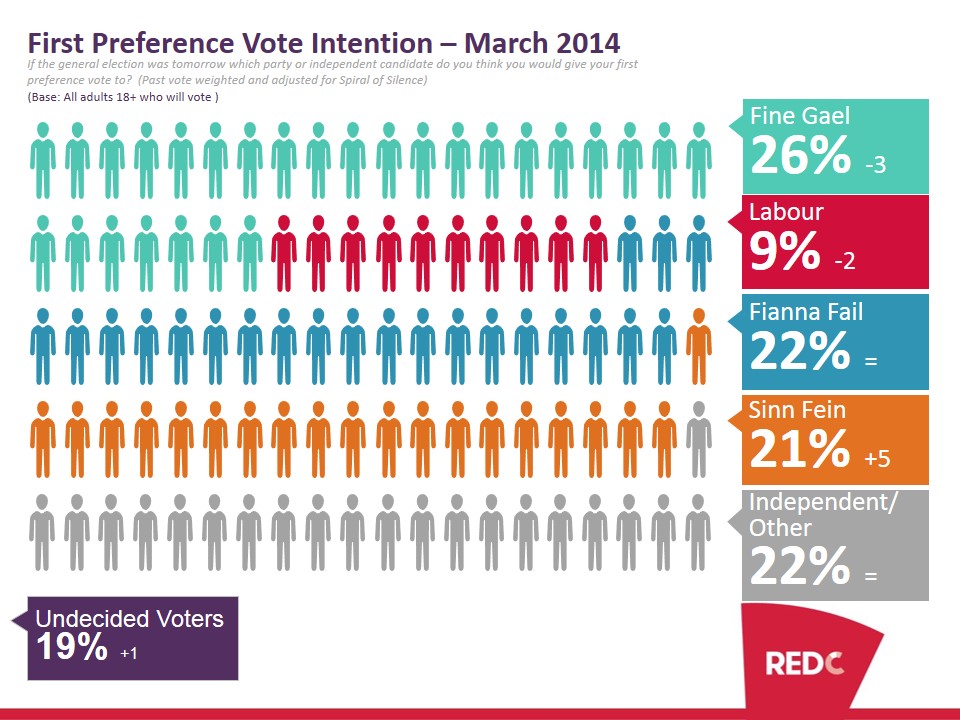“Gardagate” knocks government support
2014.03.31The government parties have both suffered a drop in public support as the fallout from the controversies surrounding the Garda Commissioner and Alan Shatter continue to reverberate. This months RED C poll for the Sunday Business Post was conducted in the eye of the storm surrounding the penalty points, GSOC accusations of espionage, and the further announcement that the Gardaí had been systematically taping calls to certain Garda stations.
Fieldwork for the survey began on Monday night, at which time pressure had only started to build. On Tuesday morning, to many peoples surprise, the Garda Commissioner resigned, and the announcement with regard to the taping of calls at Garda stations without consent was made to the Dail, fieldwork then continued on Tuesday night. On Wednesday Alan Shatter gave his address to the Dail, and apologised for previous comments with regard to Whistle-blowers, but despite calls from the opposition didn’t resign himself, and fieldwork for the poll was completed that night.
The cumulative effect of these events on party support is stark. The proportion of voters that claim they would vote for the government parties has fallen by 5%, when compared to the same poll a month ago. Perhaps for the first time, anger appears to be more directed at Fine Gael than Labour, with the party losing 3% support in the past month. This leaves Fine Gael securing 26% of the first preference vote, its lowest level since the last election, and a position it has only seen once since the election. The last time support for the party fell this low was back in May 2013, and would you believe Alan Shatter was heavily associated with the last drop in support. At that time he courted controversy with the use of potentially confidential Garda information in regard to Mick Wallace mobile phone use when driving. There was however at that time also the fact that many voters had been required to register for property tax in the month running up to the poll, and there was also a lot of party infighting with regard to the Abortion legislation.
There are two things to bear in mind about the fall in support this time for Fine Gael. The first is that on Monday when polling began, and a third of the interviews were conducted, the issue was not nearly as bad for the party perhaps as it is now, so potentially the drop could be even worse than stated. Indications from the interviews conducted on Wednesday (while not completely reliable as only part of the sample and a small base size) certainly suggest that the parties support could have been lower if all the interviews were conducted from Wednesday onwards. The second point however is that despite the poor coverage the party is receiving; its fall is still within the margin of error, and only down to a position that it has recovered from before.
Despite Labour ministers not being intimately involved in the controversies, and clearly looking for some kind of apology from the commissioner and Alan Shatter at the weekend, they are not spared the public’s annoyance. Support for the party falls back 2% in the past month, to leave them securing 9% share of the first preference vote. This is also the worst level of support for Labour since the last General Election. The fact that the party has hit this low three times in the last five RED C polls is of course a major concern for the party, at the moment it appears that every gain they make is quickly knocked back with some new controversy in government, even if it doesn’t appear to be of their making.
The reality is that the electorate often see the smaller party in any coalition as the watchdog of the larger party. In Labours case they even emphasised this role to help them get elected at the last General Election, by promoting the need to ensure there wasn’t a Fine Gael majority. So when the government is under pressure they suffer by inference, even if not directly related to the issue. The public expect them to stand up to their larger partners and ensure they act appropriately.
The main beneficiary of the government parties decline is Sinn Fein. Support for the party jumps a full 5% in response to the government parties decline, and in this regard they are clearly seen as the effective opposition in for this issue. This is a very significant increase in support, and Sinn Fein have only once before reached this level in RED C polls back in May 2012. While it may not be directly relevant, the gains in support for the party may well also have been bolstered by Mary Lou McDonald’s appearance on the Late Late show on Friday and her performance on the “Gardagate” issues in the Dail, which anecdotally has shown her in a very good light among many who saw it who may not have been die hard Sinn Fein supporters.
There is no such bounce in support for Fianna Fail, which will be a major disappointment for the party, and this is despite also holding their annual conference at the weekend, which often gives political parties a lift. It appears to be increasingly hard for Fianna Fail to get out of the low twenties in terms of share of the first preference vote, and despite good gains last year they appear a little stagnated now.
At the same time, while Independent candidates have also been fairly vocal on the Gardagate issues, they too don’t register any gains at the government’s expense. In fact support for Independent candidates falls back slightly with the Greens picking up support to 3% for the second time since the last election.
Download the full report below
SBP March 2014 Poll Report


